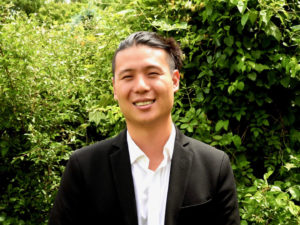 Charles Dhong is currently an Assistant Professor in Materials Science and Biomedical Engineering at University of Delaware. He received a PhD from Johns Hopkins University followed by postdoctoral studies at University of California, San Diego. His research group is interested in measuring or controlling the mechanical forces at biological interfaces. Biological interfaces, ranging from cells to the human sense, are complex because they are soft and patterned. Although they are complex, controlling these biological interfaces are important in a range of applications, including basic biology, cancer detection, and virtual reality for the sense of touch. To achieve these goals, we build devices, perform simulations and modeling, and incorporate new materials including conductive polymers and graphene sensors. He can be found on Twitter @CharlesDhong.
Charles Dhong is currently an Assistant Professor in Materials Science and Biomedical Engineering at University of Delaware. He received a PhD from Johns Hopkins University followed by postdoctoral studies at University of California, San Diego. His research group is interested in measuring or controlling the mechanical forces at biological interfaces. Biological interfaces, ranging from cells to the human sense, are complex because they are soft and patterned. Although they are complex, controlling these biological interfaces are important in a range of applications, including basic biology, cancer detection, and virtual reality for the sense of touch. To achieve these goals, we build devices, perform simulations and modeling, and incorporate new materials including conductive polymers and graphene sensors. He can be found on Twitter @CharlesDhong.
Read Charles’ Emerging Investigator article ‘Controlling fine touch sensations with polymer tacticity and crystallinity’
How do you feel about Soft Matter as a place to publish research on this topic?
As we work on using materials chemistry to control touch, Soft Matter has been an excellent venue for publishing work at the intersection of materials chemistry, interfaces, and human psychology. Although we believe touch has many aspects that are traditional to soft matter mechanics and materials, the inclusion of human subjects and psychophysics requires an appreciation for interdisciplinary research. At the same time, the fundamental and rigorous approaches of research in Soft Matter help ground our work in established adhesion and interfaces science.
What aspect of your work are you most excited about at the moment and what do you find most challenging about your research?
We are excited to see how many everyday textures and feelings we can create just by changing materials chemistry. With emerging areas of virtual reality, and neglected areas of accessibility aids for people with low vision and blindness, touch still remains an open area of exploration. One of the most challenging parts is that coming from a surface science background, working with human subjects data can be inherently variable. However, replacing human participants with machine mimics often does not replicate key parts of tactile perception. We still need ways to quantify and describe touch in ways that are unbiased, consistent, yet still remain useful.
In your opinion, what are the most important questions to be asked/answered in this field of research?
I think the field is wide open, but I believe an important part of touch is to develop a standard and basis to communicate findings. Right now, unless you physically try the device of another lab, it is difficult to gauge progress. While perception is subjective, other fields like vision research have clearer standards or metrics to compare work. However, touch is inherently difficult because the human finger not only senses touch but is also an active participant in generating stimulus through mechanical forces: How you touch an object changes the forces and tactile stimuli generated. In other senses, like vision, the eye does not influence the source of stimuli, e.g. a light bulb will emit the same stimuli to any subject.
Can you share one piece of career-related advice or wisdom with other early career scientists?
People say that side projects can suddenly morph into key directions for a lab, and that’s been true for us. Classical areas today often started as brand new niche concepts–maybe as a side project–and most communities are open to new ideas or directions.










